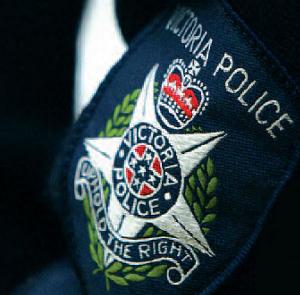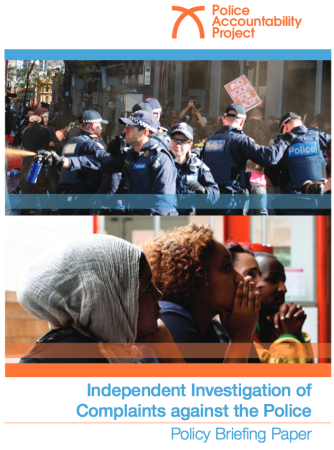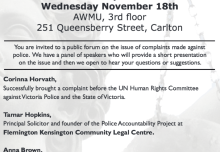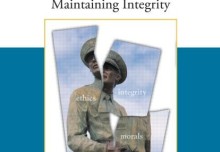Call for submissions open now
6 July 2017
The Victorian Parliament’s IBAC Committee has announced an Inquiry into the external oversight of police corruption and misconduct in Victoria.
This very welcome initiative is the first such parliamentary review in several decades. Parliament has a particular responsibility to ensure the effective and impartial investigation of complaints against police.
This inquiry is in response to concerns raised by the community and organisations such as ourselves over many years and we thank the IBAC Committee for taking on this important task.
Submissions are only open until 3 August.
It would be fantastic to get as many submissions in as possible – both from community organisations but also from members of the community who have experienced the current internal complaints/police investigation system.
This is your chance to let Parliament know what you think is needed for a fair, impartial and human rights compliant investigative model in Victoria.
- best practice oversight models
- challenges faced by those overseeing police and by complainants
- strategies to improve oversight.
Terms of Reference are set out below and here: https://www.parliament.vic.gov.au/ibacc/inquiries/inquiry/922
The Inquiry will also include the oversight of Protected Services Officers (PSOs).
The Police Accountability Project believes that ‘oversight’ is not enough and has been calling for a fully independent, investigative model for some time now.
Human rights standards and community expectations demand that investigations of complaints against police be conducted by a body which meets these five benchmarks:
1. Independent of the Police—hierarchically, practically, culturally and politically;
2. Capable of conducting an adequate investigation;
3. Prompt
4. Open to public scrutiny; and
5. Victim-centred, and enables the victim to participate in the investigation
Information and resources on this model can be found here.
Making a Submission:
Any person or organisation can make a submission.
Your submission should address one or more parts of the terms of reference.
Your submission can include facts or opinions, recommendations or suggested solutions and personal experiences with the police complaints system.
There is no set format. It could be a letter, paper or report or you can submit online.
Make your submission brief and clear. If your submission is long, include a summary of your key points on the first page. Please number the pages in your submission.
Make sure your submission is readable. Committees prefer submissions to be A4-size and submitted electronically as a Word or PDF file.
Make it clear who the submission is from. If you are making a submission on behalf of an organisation, please indicate your position in the organisation and the level at which the submission has been authorised.
Sign your submission. Please sign your submission. If you are sending your submission electronically, please provide your name and contact details (such as address or phone number).
In general, all submissions accepted by a committee are public documents. This means that the submission may be published on the committee’s website and quoted in the committee’s report to the Parliament.
However, you may request that:
- your submission (or part of it) be treated as confidential; and/or
- your name, address and any other information that could identify you be withheld, i.e. removed from the published version of the submission.
Please contact the committee to request that your submission be treated as a confidential or name withheld submission.
Phone: 03 8682 2815
Email: ibacc@parliament.vic.gov.au
The committee will not disclose or publish any submission which it has accepted on a confidential basis. However, confidential evidence will be kept and, in some circumstances, may be released after 30 years.
If you would like help with your submission or have any questions please contact the Police Accountability Project at: pap@fkclc.org.au
Submissions will close on Thursday 3rd August.

How should police misconduct be investigated?
Do you want your complaint to be investigated by someone other than a police officer?
This is your chance to let Parliament know what you think is needed for a fair, impartial and human rights compliant investigative model in Victoria.
Media:
Call for submissions during public probe into police complaints system Rebecca David, Herald Sun, 9 July 2017
CONCERNS about the “woefully inadequate” police complaints system have prompted a public inquiry into investigations of police corruption and misconduct….
For more information:
- Independent Investigations
- What is the ‘Horvath Test”?
- IBAC Recomendations fail the “Horvath Test”
- Police Complaints Clinic Report
For a reference please see our Policy Briefing Paper on Independent Investigations.(PDF)

2 Comments
-
An excellent, bi-partisan initiative. This is a wonderful opportunity for an independent review of the current oversight arrangements in Victoria. For the first time, a panel, informed by experts and not just the usual suspects ( eg community legal centres), will take a look at the best practice models for oversighting police activities, especially complaint handling. With very few exceptions, the current Victorian model is up there with the best in the world. Very few informed people are advocating for a completely independent body to investigate all complaints against the police. Apart from being totally impractical (what government is going to commit the tens of millions required to hire several hundred investigators to handle the more than 4,000 complaints received every year who are experienced in investigating murder, sex crimes, major fraud, crime scene examination, ballistics, forensics, human source development and handling), such a move is recognised around the world as relieving the police of responsibility for maintaining an ethical workforce and efficient service delivery. Outsourcing the complaint handling process effectively gives police management a get-out-of-jail card. Another body is responsible for handling complaints and ensuring ethical behaviour so police bosses they can take a pass on it. Hardly a desirable state of affairs. No. Best practice is for the police to retain most matters for investigation while being oversighted by a competent and well-resourced body such as IBAC. I trust that once the Committee makes its recommendations, the shrill demands of those vested interests at the margins will receive the significant indifference they deserve.
-
Author
Thanks Clive – for your insights and and some nice back-handed compliments. You highlight two of the big myths surrounding independent investigations of police; that it will cost too much and it will remove the ability of police management to improve their workforce. Both have been addressed in numerous publications and practically by other jurisdictions where well resourced investigative bodies operate. Firstly re cost. Properly investigated and adequately addressed allegations of human rights abuses by police would potentially save the state millions. It would free the 200 serving members currently deployed within Professional Standards Command from investigating their own colleagues for frontline police duties and potentially address complaints that currently end up in expensive civil litigation cases. In Northern Ireland (PONI) independent investigation costs 1.127% of the total budget for police.
In New Zealand, independent investigation is 0.28% of the total budget for the police. In Victoria, then, if we took a figure somewhere in between these two figures, we would expect to need to pay $16 million a year for independent investigations. ( 0.7% of the total police budget.) This is a very modest price to pay for the size of the police force in Victoria and the importance of the issue. Furthermore, Victoria Police currently pay for internal investigation. The money spent on police internal investigation could be re-directed back into the overall police budget.
Secondly – an independent body would not replace the Management Intervention Model (MIM) currently used within Vicpol. Professional development, training and complaints regarding rudeness, professional standards would remain the responsibility of local or regional management. What would be independently investigated would be allegations of potential unlawful misconduct and or human rights abuses – often incidents and issues that cannot and should not be investigated by local managers or colleagues allocated by PSC. Furthermore- an outcomes and recommendations by the independent investigation team would be fed directly back into police training, policy development and local area management strategies for implementation – in much the same way that airline companies have to take on board recommendations after an *independent* investigation of an air crash or near-miss incident. There is no ‘get-out-of-jail’ card. Quite the opposite in fact. Independent investigations would likely result in vastly improved policy, training and operational practices that will enhance both police and public safety.
Our key point is oversight is not enough. An expert, independent body must lead and carry out, the actual investigation. Police investigations, even when supervised by an independent body, have been held to be insufficient for the purposes of safeguarding investigative independence of deaths caused by police. An oversight or ‘review’ model, where an independent body oversees police led investigations into complaints against police, cannot compensate for poor or ineffective investigation. First, because it is often not possible to cure deficiencies in an investigation once it has been carried out (eg, key evidence may no longer be able to be obtained). Second, because it is very difficult to restore trust and confidence in a community that holds concerns about a police led investigation, particularly into very serious complaints including a death caused by a police officer, through an ‘oversight’ or ‘review’ model.
-






